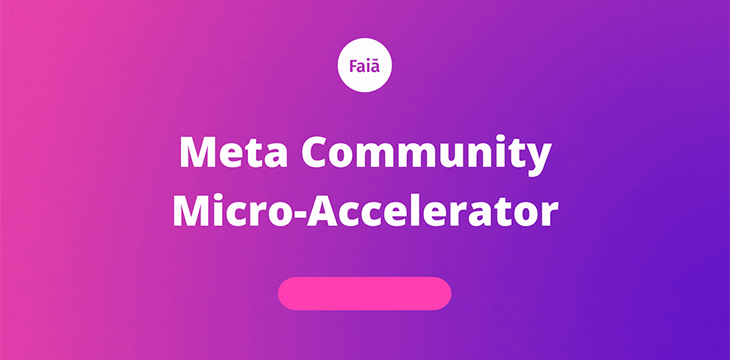|
Getting your Trinity Audio player ready...
|
Where does a budding Web 3.0 entrepreneur even start? Interaction between actual humans and their communities is vital to building Web 3.0 and the metaverse, says Faiā. The company recently held its first “Meta Community Micro Accelerator” (MCMA), a week-long online event aimed at connecting entrepreneurs and “getting past the hype to build with substance.”
The MCMA did not focus on any one blockchain, digital asset or technology ecosystem. Rather it was aimed at any marketers, strategists and managers with ideas on what concepts will be important as next-generation online networks form. Faiā hopes that connecting minds to share these ideas will lead to better outcomes.
“Community is becoming the default for almost all Web 3.0 and metaverse,” says Faiā. It’s a space which is “designed to be collectively-driven, while individually owned.”
Feedback from the first event appears to be positive. The sessions discuss topics such as community dynamics and frameworks, while helping to define a clear purpose for each participant’s own community by categorizing its characteristics. By the end of the week, attendees had a better idea of what platform to use, and were in a better position to start engaging with their target communities.
This micro-accelerator taught me how to build the foundations of a web3 community. Going to put their skills to practice so keep your eyes open 🦋
This is the perfect program for a creative, investor, or startup. https://t.co/SW6NBBOODb
— Erika Echaniz (@erika_echaniz) January 15, 2022
Hi all! Just finished an incredible week learning from these cool humans about how to build a #community from scratch. Lots of practical and usable tips and frameworks. HIGHLY recommend! @GeorgeSiosi, @oracleofbalance, and @katherine_roan were great facilitators. We were on FAIĀ! https://t.co/EsuSmHZjg8
— Shauna Anderson (@ShaunaSSCS) January 15, 2022
Faiā charges US$250 to attend the micro-accelerator program and is now taking applications for its next event in February 2022. It invites those it describes as being forward-thinking and valuing human connections, “entrepreneurs who play the long game, not the quick-buck.”
Getting past the tech buzzword storm
“Web 3.0” (sometimes called “Web3”) is a field filled with buzzwords and promise (and is a buzzword itself) so the key questions are often as basic as: What does all this actually mean? Like online trends of the past, it’s just a collection of concepts until those building the platforms can define them.
The basic assumption so far is that Web3 is based on blockchain technology somehow, with economies built around decentralized communities and DAOs, tokens and digital assets. The term was first mentioned by Ethereum co-founder Gavin Wood in 2014.
“Web 2.0” appeared as the web evolved from static, one-way web pages to something more interactive. From it rose concepts like social media and user-generated content. Most take these for granted these days, but the structures they’re built upon have created their own sets of issues.
These issues mainly concern ownership of data and privacy, as well as (more recently) censorship, control, boundaries of acceptable behavior and who should be allowed to set them. Blockchain technology hopes to solve these problems by keeping information interactive and accessible, but with more control handed back to users. Owners of data should be allowed (in theory) to decide on levels of access that should be granted to social platforms and third-parties, and be able to take their content to another platform should one be unsuitable.
For example, if your Facebook, Twitter or YouTube account is suddenly banned—or if you’re not reaching the right audiences there—you can’t simply move all your content to a new network.
To solve this, a blockchain must be able to process large amounts of data quickly and inexpensively. BSV so far is the only blockchain to prove it can do that without hitches, but BTC and ETH remain far more popular thanks to first-mover advantage and network effect. Entrepreneurs need to take all this into consideration before launching a full-scale project, to avoid costly re-thinks later on.
Faiā is a company that has built tools in the BSV blockchain space, such as accountability-tracker Honā. Its micro-accelerator program looks at more general meta-issues surrounding Web 3.0 and its buzzword collection, using the company’s Community Dynamics™ profiling tool to determine their “type” and promote harmonious communication between communities no matter what platform they decide to build on.
Watch: Fundstrat keynote presentation at CoinGeek Zurich

 02-15-2026
02-15-2026 




